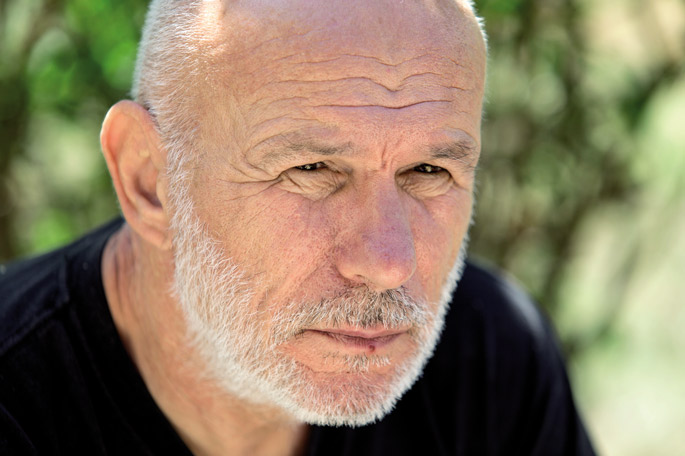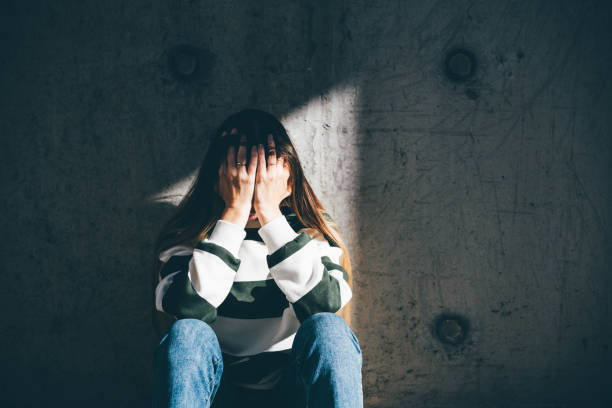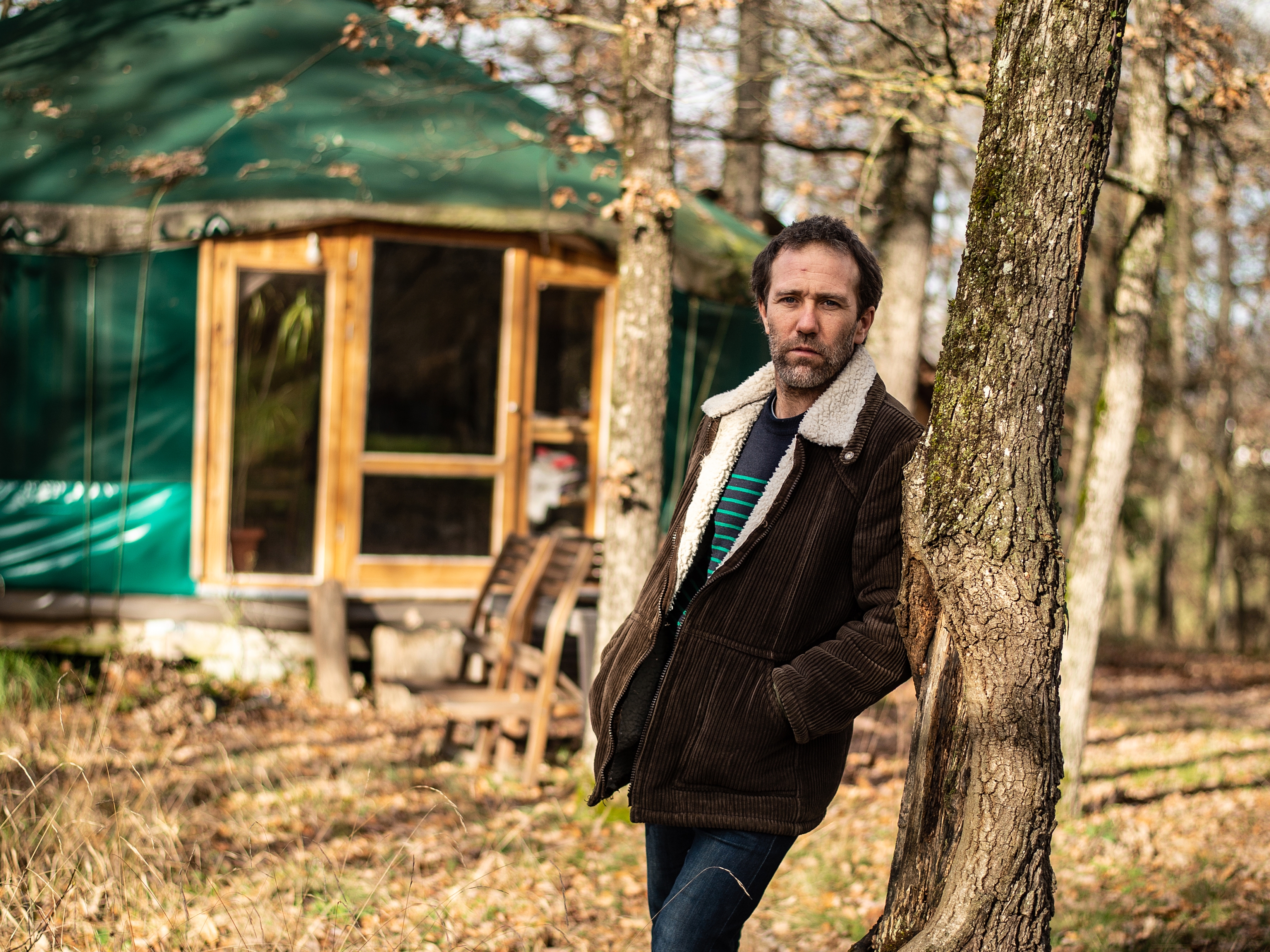"We're all on probation, I know."
- “Avanti or popolo, alla riscossa: bandar rossa, bandar rossa...”

May 1968, 16 years...
First demonstrations, first escapes with the police... I went from being a member of a group that played English pop with my college colleagues to being part of a political group. My father was a revolutionary Social Democrat, my communist mother, one of the first members of the regional communist party, but he gave me the practice and political action in May 1968. I was in Tolosa, the capital of the Reds, surrounded by refugees from the Spanish Civil War, and then I went into an organization as diverse as structured that I was not afraid to act illegally. In the Spanish Revolution, the II. In the resistance of the World War and in dealing with people who had been in machines, the use of weapons was natural. It was the colleagues who politically educated me who helped massively arm ETA for the first time. Thus, during the Burgos trial, I was sent to Baiona to provide logistical support to ETA. He ate ETA V.ekoekin and ate ETA VI.ekoekin. Curiosities of the times of division. Shortly afterwards I met Oriol Solé and by the time I realized I was in Barcelona.
Tolosa, Baiona, Barcelona... So simple, so natural?
When you lived in Tolosa and had no more than refugees coming from the Spanish State around you, the choice of arms was innate. While the Maoists were proclaiming that they would take possession of weapons, we had explosives and rifles on the floors. Taking them and crossing the border was a natural thing for us. The same fight was to pass the arms to Donostia or go with a pistol in Barcelona. Everything was part of a wonderful, wonderful and happy life. In 1974, after the execution of Puig Antich, I was arrested in Paris, I was released in 1977, but the day after my release I fought again. By then my organization didn't exist anymore, but I met many people in jail who were fighting the Transition's betrayal. Involved in the struggle of the self-employed, he was immediately in Barcelona and in Madrid. However, I soon aroused suspicions about their forms of struggle, I felt closer to the Italian self-employed and I headed to Milan. Thus, for several years I secured the connection between the movements of France and Italy.
Until the creation of Action Directe?
In the context of autonomy, we had a coordinator of all the military political groups attacking or passing arms, and the creation of Action Directe was nothing more than a change of name to the coordinator. In Paris, the movement of autonomy, the offensives and the struggles for the steel industry, the people who wanted power over autonomy, and the hasty need for armed struggle pushed us. But I can't talk much about that time, the judges prevent me from doing so. France has a tremendous problem with its memory. They know that memory is a battlefield and relate it to the disappearance of memory and prisoners. Over the course of history, France quickly realized that prisoners who were not resigned had to be released. There is nothing else to do with the school of terror which they practised in Indochina or Algeria and which they exported to Argentina and Uruguay. While in all parts of the war men were buried in common graves, France threw the bodies of its enemies into the sea. Interestingly, when I was fit, my picture was everywhere, and now you don't want to see it anywhere.
What is living in shape?
It's not what people think, it's not about carrying a gun over 24 hours a day. 90% of the time you are in an apartment, you make the vulgarities that anyone does, you try to manage your joys and your sorrows... You're not safe from day to day. Then it's true that when you leave the house in the morning you don't know if you'll come back at night. You don't know if you'll have to move, you'll be arrested, you'll be killed... To survive on the front line, you need enormous mobility and psychological strength. They only teach you to maintain that instability when you're convinced of your politicization and of the goals and reasons for your struggle. If you're clear about what you're doing, you face all the crackdown incidents. If, in the revolutionary struggle, you decide to oppose imperialism and the bourgeoisie with weapons, you cannot think “it is not entirely my choice”. From the moment you hit, you do all the collective responsibilities. That is why struggle, including satiety, is for me a terrible joy, an opportunity to free myself from a murderous world and put me on a watchtower full of hope. A militant who lives the armed struggle in an uncertain or fatal way has to flee, has to abandon everything. Because armed struggle is not an obligation. Every time I hear the regrets that forced them into armed struggle, I don't know if I laugh or cry. An armed movement knows that it cannot force its militant to anything. He knows that his success depends on politicization and the responsibility of his peers. Armed struggle is always collective, it's always based on trust in the neighbor, and every time someone says to me, "I've done this," it stays out of play.
For the State is the definition of exclusion to impose total isolation of seven and a half years after arrest?
They held me back like this. There you feel the importance of the strength of determination and of political responsibility. You can't go down, you don't have a right. You're in a permanent 24-hour conflict to life or death, they do everything to despair, and all you have to do is not despair. It's the only one you should never forget. But you get the news that your colleagues have become sick or are starting to lose their mind, you realize you're losing the conversation... I couldn't speak anymore, I forgot. When your only word of the day is greeting the official, you get to the complete disconnect between the idea in your head and the way of expression. I ended the sentence almost at the beginning, and, of course, no one understood me. I started reading aloud for a couple of hours a day, and the struggle was that I didn't lose my word and become possible again. They know that you will endure it for a year, two years, three years, but the deficiencies and deficiencies will emerge. This is where you have to keep your head cool. States are much more advanced in torture than in democracy. The time has come when your nails were ripped off, now you feel much more mute.
What's behind the walls of the jail?
Sublimation of the worst of society: murder, torture and above all the misery of the people who incarnate caregivers. When resistance is organised to deal with it, impossible networks of human solidarity are woven abroad. It is one of the strongest weapons of political prisoners. They will do everything to ensure that there are no political prisoners officially. First, from morning to night, the decree annulling the figure of the political prisoner was adopted: “You are a prisoner like others, but quiet, we have for you the cider of another barrel.” Ideologically it is very important for them to depoliticize any resistance to democracy, that those of us who dream of another world appear as animals or as mentally ill. They say that we are isolated, rigid, square, cold and unrooted people, that we never fall in love, that we have no affection ... Why did Idoia López Riaño call “Tigresa”? In his imaginary, because only anger can lead a woman to armed struggle. They wanted to state that behind Idoia's political commitment there were no convictions, which was nothing but the fate of a very bad woman. At the same time, what about the discourse about the sacralization of life? This sermon fills the mouths of those who like pesticides, asbestos, wars or workers’ bondage! They're industrial killers, and if we've ever killed someone, it's been like craftsmen. That is why I say that we do not enter prison as criminals, that we take responsibility for what we have done behind us, and that in prison the fight continues. In this offender factory, I took the testimony as a combat mold. Writing is the continuation of my political struggle, because literature is always the testimony of a reality of struggle.
You won't be missing writings.
Don't believe it. In the absence of such a fighting reality, I am not able to write. In jail, it was much easier for me to write, when I was writing, I debated myself. If I were in Catalonia or Venezuela I would dance the pen more comfortably, but looking at these concerns... When I don't fight, oppression is more evident to me. When I'm fighting, I'm much more aware that we live in a tirana society where people don't have autonomy. You can't get out of the track, from birth to death your life is focused. In the last 25 years, France has become a hyper-reactionary country. Both in Europe and in Troika are the rulers who are not elected by the people, and if I am not mistaken, that is fascism. When the Syriza people came to ask me what they were going to do with the political prisoners and the prisons, I suggested to them that an extreme left-wing force should proclaim amnesty. They told me that they could not, that two NATO and EU texts banned the amnesty of Basque political prisoners. As a guarantee of the support of the United States, England has been the only one to have faced the prisoners of anger. The system does not want to repoliticize the people who have opposed it. What's going on in Basque Country? Deny the collective outputs and that only the individual ones are on the table in the long term. What is that if it's not depoliticizing a struggle?
What would you write about forgiveness, regret, condemnation?
They are typical blackmails that are made to political prisoners. At 18 months of being admitted to prison, he approached us by saying that we were going to the street if we wrote a political text that turned our back on everything we had done. That is how it has been for a quarter of a century that prison has lasted. This is the programme of the system for political prisoners. Admit it or not. At the time of Lizarra-Garazi, he told the Basques that the relationship of forces in Euskal Herria changed at the root if 700 prisoners were beaten out, which was a letter that had to be played to the end, even if the prisoners exchanged with the weapons. Today, however, I do not understand how Basque agents no longer value the axis and political treasure of political prisoners. I do not believe that Basque prisoners are just prisoners of an organisation, but are also prisoners of whom we want to change the world. That is why we should carry out very aggressive liberation campaigns, challenge authorities and leaders, take the streets... At the moment, however, I do not see a consistent and defined line with the subject. Having so many prisoners, how will the prisoners not be one of the pillars of their liberation movement? It would be impossible for the IRA to abandon the fight unless the prisoners were released.
You were granted the third grade, but from what you said in an interview you were re-incarcerated, and now you are on probation.
The third grade is a big paradox. It's very difficult to get out of jail when you have to sleep in jail. It's schizophrenic that you spend your nights thinking about how to escape from jail and tap the doorbell at the jail door. I'd rather put on the electronic bracelet rather than being in the cell, but it's a way to extend the sentence, a slot to keep you more controlled. Thus, in an interview I claimed that the armed struggle was a phase of the revolutionary process, that as a method of liberation was insurmountable, that without weapons there would be no extreme revolution. Syriza or Podemos show that without a radical radicalisation of the bourgeoisie it is not possible to carry out the minimum reforms. What they propose is a more humane management of capitalism, not a transformation of the everyday lives of the oppressed and exploited masses. Therefore, there is no revolution without the risk of arrest. We're all on probation, but I know.
1952ko abuztuaren 30ean Auchen sortua (Okzitania). MIL, GARI eta Action Directe-ko ezker muturreko militante historikoa. Kartzelan zein sasian sartu-irtenak egin ondoren, 1987ko otsailean atxilotu zuten, bizi osoko bi kartzela zigorrera kondenatu, eta zazpi urte eta erdiz erabateko isolamenduan atxiki. 2007an hirugarren gradua eman zioten, baina 2008ko elkarrizketa batean esandakoen ondorioz lehen gradura itzuli behar izan zuen. 2011n atera zen berriz eta baldintzapeko askatasunean dago ordutik. Beste askoren artean, De Memoire (I, II, III), Chroniques carcérales eta Autopsie du dehors liburuen idazlea da.
“Ez naiz ezpal bakarreko enborra. Oso gaskoia naiz, baina aldi berean oso katalana, anti-autoritarioa, baina antolakuntza eta antolakundeen aldekoa. Kontraesana da erresistentziaren dinamismoaren motorra. Nire kontraesanek mugitzen naute eta nire kontraesanekin mugitzen naiz”.
Macron made his press conference on 12 June to read the elections to Parliament. Above all, it has had the time to repeat that the right end and the left end are both landers exactly the same. Although he has criticised one and the other, he has opened up ideas of charm of the... [+]
I will spare you too many explanations and details, the esteemed reader who looked at this text. The issue is very simple. I'll talk about you, about me, about all of us. I am going to refer to the amazing travellers of this boat that is still floating without direction and ever... [+]
The crisis on the left jumps to Latin America. Until recently, progressive governments could be found on almost the entire map of the region. But things are changing in recent months. The three presidential elections marked a turning point: Daniel Noboa won in Ecuador, Javier... [+]
“And what is the weather she perceives for Thursday?” I asked the feminist militant that she was organizing the A30 strike. “The truth is that lately I’ve had my head in a conflict at school,” he replied with a serious face.
The Vox Solidarity party union called for a... [+]
When analyzing the history of social movements and protest, the most abundant studies are those of the Contemporary Age. Sources are more abundant, conflicts are more abundant, and researchers also share the view of the world of research. That is, as we pass through the sieve of... [+]
French and Spanish leftist parties and movements have a different relationship with the concept of nation and with nationalism. This completely conditions the relationship with the Basque nationalists. But why? The key to the theme lies in the different processes of creation of... [+]
Euskal Herrian "paradigma iraultzaile berria" zabaldu eta garatu nahi duen Kimua ekimen herritarra zenbait herritan aurkezpen bira osatzen ari da. Hala Bedi irratian Kimuako kide batekin hitz egin dute proiektuaren inguruan gehiago jakiteko.























